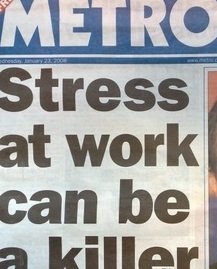
Work-related stress
 Work-related stress can be caused by various events. For example, a person might feel under pressure if the demands of their job (such as hours or responsibilities) are greater than they can comfortably manage. Other sources of work-related stress include conflict with co-workers or bosses, constant change, and threats to job security, such as potential redundancy. Whether or not a person experiences work-related stress depends on the job, the person’s psychological make-up, and other factors such as personal life and general health.
Work-related stress can be caused by various events. For example, a person might feel under pressure if the demands of their job (such as hours or responsibilities) are greater than they can comfortably manage. Other sources of work-related stress include conflict with co-workers or bosses, constant change, and threats to job security, such as potential redundancy. Whether or not a person experiences work-related stress depends on the job, the person’s psychological make-up, and other factors such as personal life and general health.

- Depression
- Anxiety
- Feelings of being overwhelmed and unable to cope
- A drop in work performance
- An increase in sick days or absenteeism
- Sleeping difficulties, such as insomnia
- Cognitive difficulties, such as a reduced ability to concentrate or make decisions
- Fatigue
- Headaches
- Heart palpitations
- Gastrointestinal upsets, such as diarrhoea or constipation
- Increased aggression

- Long hours
- Heavy workload
- Changes within the organisation
- Tight deadlines
- Changes to duties
- Job insecurity
- Lack of autonomy
- Boring work
- Insufficient skills for the job
- Over-supervision
- Inadequate working environment
- Lack of proper resources
- Lack of equipment
- Few promotional opportunities
- Harassment
- Discrimination
- Poor relationships with colleagues or bosses
- Crisis incidents, such as an armed hold-up or workplace death.


|

|

|
Resveratrol stimulates energy production in the cellular powerhouses known as the mitochondria and thus improve your energy level. |






























